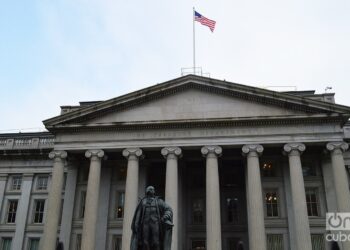The Daily Caller is not a very influential and prestigious news website. Neither in Washington DC, where it is based, nor in the entire U.S. territory. Founded seven years ago by editor Neil Patel, former Vice President Dick Cheney and Tucker Carlson, current political commentator of Fox News and protagonist of the show “Tucker Carlson Tonight,” of the same chain, it is a conservative response to the liberal The Huffington Post, and is not precisely known for making incursions into Cuban affairs. The fact that it did so on May 29 with a very conspicuous headline, “Exclusive: Trump Set to Roll Back Obama’s Cuba Policies,” could have different readings.
One of them is that over there the opinions of sectors within the GOP opposed to that roll back or the more or less partial dismantling of the Obama policies toward the island are being amplified. This is more significant if it is taken into account that, according to a poll, the majority of its readers (64.8 percent) identify themselves as Republicans. It could also mean that, from the corporative point of view, some elephants from up there have aviation, cruise, telecommunication and hotel businesses that have already invested a certain amount of political capital, as well as hard cash, in the movements toward the southern neighbor.
Perhaps the aforementioned explains the absolutely non-aseptic tone of this feature article, in fact a sort of warming about three members of the Cuban American lobby’s pressure on the Trump administration to make the big roll back, according to what was said by John S. Kavulich, president of the US-Cuba Trade Economic Council, a non-partisan institution based in New York whose sole statement speaks for itself. And in a second round about the issue, on the following day, the Caller journalists were more specific: a Miami donor from the Republican Party who favors relations with Cuba had on good authority spoken of the string pulling of a prominent member of that same lobby, who voted in favor of Trumpcare in exchange for a tougher policy toward the island, a practice that in the DC lobbies is known as horse trading.
The White House hasn’t confirmed or denied it. It is being consumed by the fire of its own balalaikas and trying to make right, as much as possible, the domestic mess that has characterized it since the beginning. Struggle of factions. Nationalists vs. globalists. Bannon vs. Kushner/Ivanka. Fantomas vs. Scotland Yard. Substitutions/resignations of officials. Leaks to the press…. Scandals and problems of that type are its daily bread, to the point that reports have just come out about the creation of a “war room” close to the Oval Office to handle the avalanche and the imbroglio. And also because after all, in the midst of that great quake, Cuba is not a priority but rather (again) an island in the Caribbean.
Starting with the announcement last February of a full revision of the previous policy to what happened in almost deadly quiet, it was just known that those changes were originally going to be announced on May 20 (a date seen in a very different way on both sides of the Strait), but was postponed due to the president’s trip abroad. In politics, wrote José Martí, what is real is what is not seen. That had been happening for a long time, it wasn’t just a question of a stroke of a pen by the executive, and regarding this they are divided. There are people inside who do not agree with throwing Obama overboard. Or to slimming a negotiation process that has yielded its undeniable fruits, despite the problems involved, the mutual differences and the signs coming from down below, which for their own reasons went from being cautious to differing or last minute responses.
Perhaps now is the time. There’s a bill in the Senate, recycled and bipartisan, that would restore to U.S. citizens a long-banned constitutional right: traveling to the island as simple tourists, as they do to any part of the world. And another about agricultural exports to Cuba, which includes granting credits to private producers, backed by Sonny Perdue, secretary of agriculture of the Trump administration. A group of 16 former admirals, who get along among themselves, sent to H. R. McMaster, the national security adviser who entered the game for Michael Flynn, a clear and distinct message: “Do not break this, it’s worthwhile for us.”
The National Security Council, according to reports, has presented to the president a list of options. The pressure on the Cuban system in terms of democracy and human rights is not debatable, but it would enter rather to ratify what Talleyrand affirmed to the Bourbons: they neither forget nor learn. It’s rather easy to refer to the acting values in U.S. foreign policy, but it’s a bit more difficult to do without the classical double standard, especially when the president has just returned from buying 110 billion dollars’ worth of weapons from Saudi Arabia, a place from the Kingdom of this World where a woman can’t do things like getting a passport or traveling abroad without the consent of her husband, father or male family member. Not to mention decapitation for protesting against the monarchy and the royal family, the death sentence for homosexuality or the existence of a religious police force to guarantee the creed’s purity.
What’s most probable is that it is a course on eclectic politics. Changes in the policy on travel and businesses managed by Cuban military, an old claim by the lobby (and its surroundings), have been unofficially announced through leaks and not always grey sources. Certain specific questions, however, could be pertinent. Will Trump get mixed up in Miami with the family trips of Cubans and Cuban Americans, who travel to the island as many times as they please, as authorized by President Obama? And with the remittances, not only sources of reproduction simply for those who receive them, but also for the initial capital of those businesses independent of the State? The last poll of the Florida International University leaves no doubts with respect to this. The great majority of the Cubans in Miami Dade are against the embargo/blockade (63 percent), are in favor of economic relations with Cuba (57 percent in general, and 90 percent among the new emigration), 74 percent is in favor of removing the travel restrictions for U.S. citizens (93 percent of the recent arrivals, 69 percent of the registered voters) and 72 percent report they have sent money to relatives and friends on the island. An expression of the changes that characterize the big transnational city, a strong plaza of the historic exile today challenged by the migration, generational and cultural changes. They couldn’t get a slice without something that usually terrorizes any politician: the cost-
But Trump is Trump. The rooster on the weather vane. A buffalo on the loose on the great American prairie. Mercurial. Tweeting – despite his lawyers. And if in June it does happen, as it has been affirmed, the south of Florida would obviously not be the best place to announce it, despite the aforementioned. Trump would look at the past, like before. The pragmatism would not benefit but rather the campaign way, one of the few things he is so good at, just like dodging tax returns – because he’s very smart -, eating meat with ketchup, ordering the dropping of the mother of all bombs in front of a fabulous chocolate cake, dancing with Saudi swords and placing his big white hands on certain unnamable zones of the otherness. Ben Rhodes, one of those who from this side knows well what it’s all about, has just come out with an axiom: “Given their complete lack of concern for human rights around the world, it would be a tragic irony if the Trump administration uses that to justify policies that harm the Cuban people and restrict the freedom of Americans to travel and do business where they please.” Then, and only then, in June or later, will we finally know what parts of Obama – to say it together with Roberto Fernández Retamar – we will see burn.










